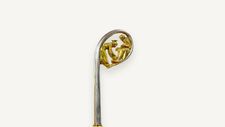
Modern Shepherd
One person bends down at the feet of another? Jesus Christ washed the feet of his disciples a few hours before his death, a sign of love and respect. Bishop Franz Hengsbach aimed to follow this example. As auxiliary bishop of Paderborn in 1953, he had Jesus washing St. Francis’ feet worked into his crook. When on January 1st, 1958, he was named first bishop of the new Ruhr diocese, officially “Diocese of Essen”, Hengsbach kept his crook of cast silver. His aspiration was to stand by the people of the rapidly growing Ruhr conurbation. The working class was particularly close to his heart.
His famous signet ring contains a piece of coal. The bishop would regularly go below ground to talk to the miners. He saw himself as a mediator and bridge-builder. As such, no visit to the colliery would be complete without also having a talk with the mine operator.
Protestant Christians were also preoccupied with the question of how the church could remain attractive in a modern industrial society. As new concepts were captivating society in 1968, theologian Dorothee Sölle took up many of the student movement’s ideas in defiance of the church establishment’s firm opposition. For several years, she and other Christians organised so-called “political night prayers” at the Church of St. Anthony in Cologne, where outrages in Germany and around the world were denounced and debated in front of a large audience.